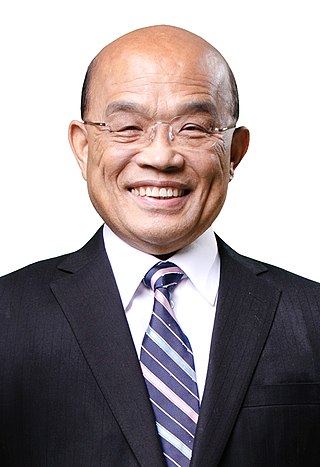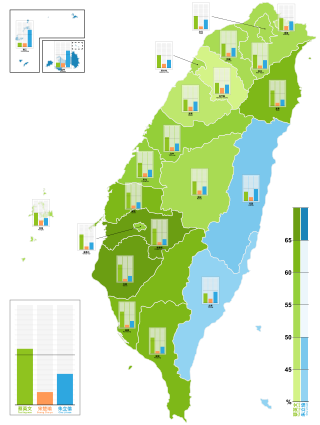
The Democratic Progressive Party (DPP) is a Taiwanese nationalist and centre to centre-left political party in Taiwan. It is currently the major ruling party in Taiwan, controlling both the presidency and the central government, also the dominant party in the Pan-Green Coalition.

Taiwan, officially the Republic of China (ROC), is governed in a framework of a representative democratic republic under a five-power system first envisioned by Sun Yat-sen in 1906, whereby under the constitutional amendments, the President is head of state and the Premier is head of government, and of a multi-party system. Executive power is exercised by the Executive Yuan. Legislative power is vested primarily in the Legislative Yuan. The judiciary is independent of the executive and the legislature. In addition, the Examination Yuan is in charge of validating the qualification of civil servants, and the Control Yuan inspects, reviews, and audits the policies and operations of the government.

The pan-Blue coalition, pan-Blue force or pan-Blue groups is a political coalition in the Republic of China (Taiwan) consisting of the Kuomintang (KMT), People First Party (PFP), New Party (CNP), Non-Partisan Solidarity Union (NPSU), and Young China Party (YCP). The name comes from the party color of the Kuomintang.

The Legislative Yuan is the unicameral legislature of the Republic of China (Taiwan) located in Taipei. The Legislative Yuan is composed of 113 members, who are directly elected for four-year terms by people of the Taiwan Area through a parallel voting system.

Su Tseng-chang is a Taiwanese politician who served as premier of the Republic of China (Taiwan) from 2006 to 2007 and again from 2019 to 2023. He was the chairman of the Democratic Progressive Party in 2005 and from 2012 to 2014. Su served as Chief of Staff to President Chen Shui-bian in 2004. He is currently the longest-serving Democratic Progressive premier in history.

Hsu Hsin-liang is a Taiwanese politician, formerly Chairman of the Democratic Progressive Party (DPP). He was a supporter of the Pan-Blue Coalition from 2000 to 2008 but then supported the DPP in the 2008 presidential election.

The 2004 Taiwanese legislative election was held on 11 December 2004. All 225 seats of the Legislative Yuan were up for election: 168 elected by single non-transferable vote, 41 elected through party-list Proportional representation, eight elected from overseas Chinese constituencies on the basis of the proportion of nationwide votes received by participating political parties, eight elected by popular vote among the aboriginal populations. Members served three-year terms beginning on 1 February 2005, and ending 31 January 2008. The next term served four years.

This is a timeline of the Republic of China.
Every Ghanaian Living Everywhere (EGLE) is an inactive political party in terms of elections in Ghana. It has not contested any elections since the 2004 Ghanaian general election. According to Ghanaian law, political parties must have a presence in all districts in order to remain registered, but due to lax enforcement, EGLE remains registered as a party as of 2019.

The National Democratic Congress (NDC) is a social democratic political party in Ghana, founded by Jerry Rawlings, who was Head of State of Ghana from 1981 to 1993 and the President of Ghana from 1993 to 2001. Following the formation of the Provisional National Defence Council (PNDC), which ruled Ghana following the military coup d'état on 31 December 1981, there was pressure from the international community to restore democracy. The NDC was formed as the ruling party ahead of elections in 1992, in which Rawlings was elected president, and in 1996 Rawlings was re-elected as the NDC candidate. Rawlings' second term ended in 2001.

Presidential elections were held in Taiwan on 22 March 2008. Kuomintang (KMT) nominee Ma Ying-jeou won with 58% of the vote, ending eight years of Democratic Progressive Party (DPP) rule. Along with the 2008 legislative election, Ma's landslide victory brought the Kuomintang back to power in the Republic of China.
In a governmental system, a party leader acts as the official representative of their political party, either to a legislature or to the electorate. Depending on the country, the individual colloquially referred to as the "leader" of a political party may officially be party chair, secretary, or the highest political office.

Presidential elections were held in Taiwan on 14 January 2012. The election was held concurrently with legislative elections. It was the fifth direct election for the President of the Republic of China. Prior to 1996, the President was elected by the ROC's National Assembly and not directly by the people.
Events from the year 2007 in Taiwan, Republic of China. This year is numbered Minguo 96 according to the official Republic of China calendar.
The 1999 Democratic Progressive Party presidential primary was the selection process by which the Democratic Progressive Party of the Republic of China (Taiwan) chose its candidate for the 2000 presidential election. The DPP candidate for president was selected through a series of member of the party in Thursday, April 15, 1999.
The 2007 Democratic Progressive Party presidential primary was the selection process by which the Democratic Progressive Party of the Republic of China (Taiwan) chose its candidate for the 2008 presidential election. The DPP candidate for president was selected through a series of member of the party in Thursday, 19 April 2007.
General elections were held in Taiwan, officially the Republic of China, on Saturday, 16 January 2016 to elect the 14th President and Vice President of the Republic of China, and all 113 members of the ninth Legislative Yuan:
The election of the president and vice president of Taiwan is a universal direct election through secret vote by the citizens of Taiwan (ROC) in the Free Area. ROC presidents are elected by relative majority (plurality), meaning the candidate with the most votes wins without a runoff requirement. The most recent election took place on January 13, 2024.

Presidential elections were held in Taiwan on 16 January 2016. Democratic Progressive Party (DPP) candidate Tsai Ing-wen with her independent running mate Chen Chien-jen won over Eric Chu of the Kuomintang (KMT) and James Soong of the People First Party (PFP). Tsai became the first female president in Taiwan, as well as in the Chinese-speaking world.
The 2020 Taiwanese general election was held on 11 January 2020 to elect the 15th President and Vice President of Taiwan, and all 113 members of the 10th Legislative Yuan.













